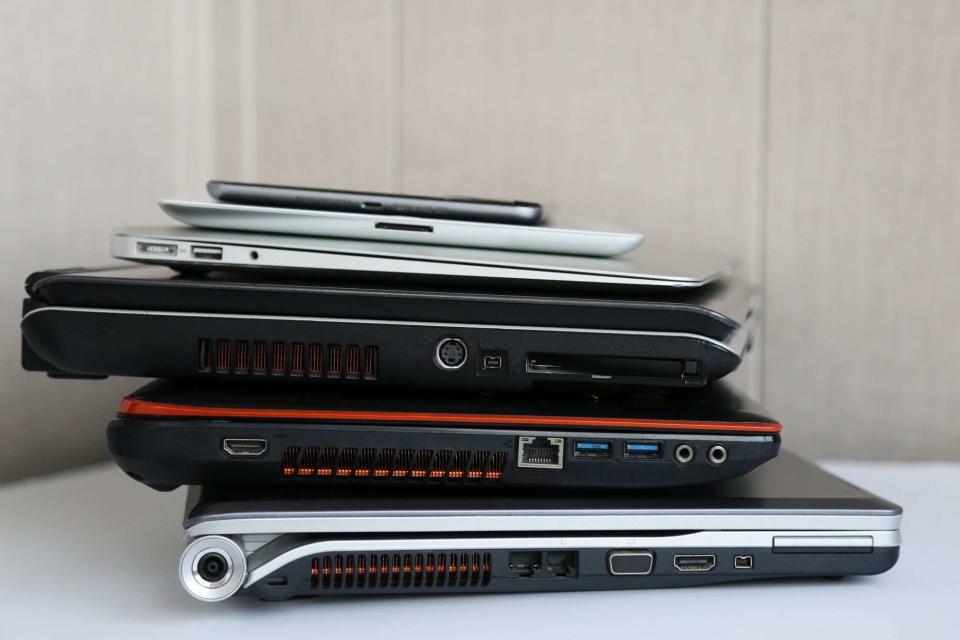The Right Way to Recycle Old Electronics and Small Appliances, From TVs and Laptops to Microwaves
Plus, learn how to donate items that are still in good condition.

It can be hard (and confusing) to get rid of old home electronics and appliances, whether it's the camera you've had for a decade or the coffee machine you've switched on every morning for years. But once these items are past their prime (or you're ready for that upgraded TV), it's important to dispose of them sustainably—so don't just drag them to the curb. Follow our expert-approved tips to properly donate or recycle these home goods.
Related: 9 Paper and Plastic Swaps You Can Easily Make in Your Home
What Not to Do When Donating or Recycling Old Electronics and Small Appliances
Donating or recycling electronics and appliances the right way is important, since it helps sustain natural resources, prevents air and water pollution, and reduces greenhouse gas emissions, according to the United States Environmental Protection Agency. However, if you're going to donate or recycle items that store personal data, delete all of your information first, says Vincent Gragnani, the press secretary at the New York City Department of Sanitation.
Also, avoid throwing home electronics and small appliances with batteries in the trash. "There are many reasons for this—among the most important from our perspective is the serious danger they pose to our workforce," Gragnani says, explaining that batteries pose a fire risk. "We remind New York City residents that it is not only against the law to dispose of lithium-ion batteries in your trash or regular recycling, but doing so endangers the lives of our sanitation workers."
How to Donate Old Electronics and Small Appliances
Before you decide to recycle your old electronics and small appliances, try donating them first, says Gragnani. "'Reduce, reuse, and recycle' are in that order for a reason," he says. "If your appliance or electronic device is in good working order, we would first encourage you to donate it to someone who might be able to use it."
Cell Phones for Soldiers
Many charities across the country accept working devices, including your old cell phone, says Jeremy Walters, the sustainability ambassador at Republic Services, a waste disposal company. Cell Phones for Soldiers, a national nonprofit organization, uses earnings from donated cell phones to buy international calling cards for active-duty military and veterans. Since the charity's inception in 2004, more than 25 million cell phones have been donated and over 400 million minutes have been provided to members of the armed forces.
Salvation Army
The Salvation Army not only allows you to donate your old home electronics and appliances (from DVD players and radios to coffee makers and air conditioners), but they can also pick them up from your doorstep. You can schedule a free pick-up or find a drop-off location. Plus, all items are tax-deductible once you donate.
Habitat for Humanity
While Habitat for Humanity is known for building homes for those in need around the world, the organization also runs Habitat ReStores, which are home improvement stores that accept gently used appliances. With the earnings from the donated items, the Habitat ReStores team helps families fund and build their own homes.
Local Events
Seek out local donation events run by churches or charities in your community to give your items another lifecycle. "New Yorkers can check out Stop 'N' Swap events, [which are] free community events where residents are invited to bring clean, reusable, portable items, including working electronics, and take home something new to you for free," says Gragnani. "Giving items a second life is always the best route to take."
How to Recycle Old Electronics and Small Appliances
Before recycling old electronics and small appliances, remove the batteries and take them to a local drop-off site. "We also ask residents using our drop-off sites to individually bag each non-alkaline battery or use clear tape to cover the terminals," says Gragnani. "Do not use opaque tape and do not bag or tape alkaline batteries."
If you have any bulk waste items to recycle, Walters recommends getting in touch with your local environmental services provider for more information on pick-up services. Once you've prepped your items, recycle them through local or national services.
Best Buy
Best Buy is the largest e-waste and appliance recycling company in the United States. The retailer has collected over 2.7 billion pounds of home electronics and appliances, ranging from TVs and computers to microwaves and ice makers. You can recycle up to three goods from your home every day by either taking them to your local Best Buy store or using the company's mail-in service.
Republic Services
Consider Republic Services' Mail-Back Program, which will help you properly recycle everyday electronics and small appliances, like laptops, power tools, and printers. "It's as easy as ordering a prepaid, pre-addressed box and mailing your old electronics off to Republic Services for proper disposal," says Walters. "Through the mail-back program, you can recycle a number of electronic items, including devices with lithium batteries."
Earth 911
You can recycle everything from home electronics to small appliances through Earth 911, the biggest recycling database across the country. There are nearly 350 materials items eligible to recycle, such as vacuums, dehumidifiers, and tablets. To dispose of them sustainably, all you need to do is call 1-(800)-CLEANUP or search the database for recycling solutions near you.
Local Collection Sites and Events
Look to collection sites and facilities in your area. Companies like The Home Depot and Call2Recycle highlight local recycling rules, regulations, and drop-off sites based on where you live. "Many local Republic Services facilities collect e-waste throughout the year, especially in the spring and fall," says Walters. "Enter your address to find local information."

